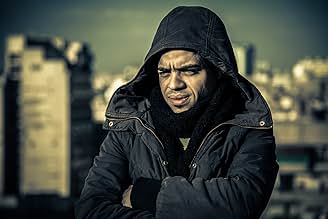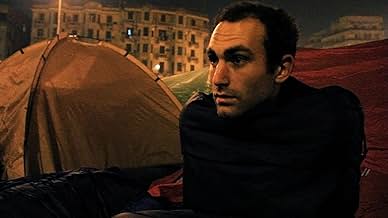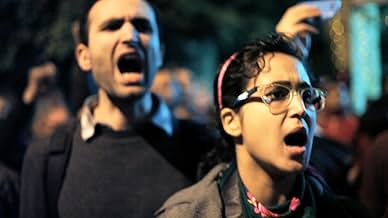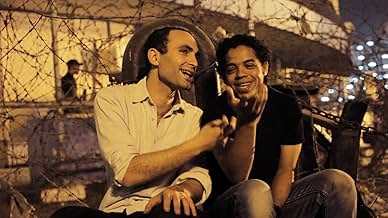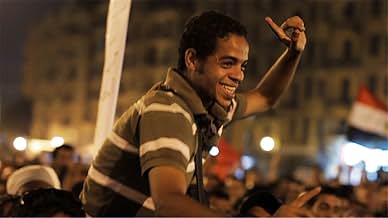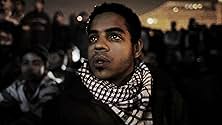Adicionar um enredo no seu idiomaA group of Egyptian revolutionaries battle leaders and regimes, risking their lives to build a new society of conscience.A group of Egyptian revolutionaries battle leaders and regimes, risking their lives to build a new society of conscience.A group of Egyptian revolutionaries battle leaders and regimes, risking their lives to build a new society of conscience.
- Indicado a 1 Oscar
- 16 vitórias e 16 indicações no total
- Self - Revolutionary
- (as Aida El Kashef)
Avaliações em destaque
This film shows very clearly how an idea of justice and government by the people can be co-opted by those who do not necessarily have the same goals. In the end, it also asks of us, the viewers, "What are you willing to do to change a situation?" It also points out that change doesn't happen quickly or easily. Most effectively, the story follows specific individuals and makes one care about how the outcome will effect them.
Americans, take note. Most of those who chanted "Yes, we can" meant "yes, HE can" and then expected the dirty work of change to be others' responsibility. This shows how hard change really is. Don't miss it.
On and off between late 2010 and 2013, thousands of protesters against "injustice, corruption, poverty, ignorance" filled Tahrir Square in Cairo,
But it was not over when Mubarak was ousted as the military took control. The people once again marched to the square demanding civilian rule.
We see incredible footage of the people's occupation of Tahrir Square, the violent attacks on the protesters, and heated political arguments in the street as secular Muslims express their embarrassment at the religious-based oppression by the newly powerful Brotherhood.
This is a sharp warning to the powerful not to mess with the people that will resonate with anyone anywhere.
S.F.
We meet 5 courageous characters, a variety of Egyptians, and we learn why they devoted the last two years of their lives to protesting in the square. The way they speak about their country is heartbreakingly direct, and when they suffer for their goals it's heartbreaking. Interesting, too, is the balance of art, protest, technology, discussion, and music in the protester's toolkits. The picture is up-close, traumatic, and fast-paced, which was all the better. When a story is ongoing, I don't want a portrait with clear summaries and 20/20 hindsight. I want the information that the revolutionaries had as they made their decisions.
"The Square" is a documentary that traces the events of Egypt's Tahrir Square protests beginning in early 2011 when millions of people took to the streets to demand the removal of President/Dictator Hosni Mubarek, who held power for 30 years. However, when Mubarek is overthrown, the army steps in to temporarily take over the countries affairs, but does not follow through with their promises to its citizens.
After a free and fair election, the military fascist dictatorship is essentially replaced by a religious fascist dictatorship under President Morsi of the Muslim Brotherhood. Once again, the protesters unite and return to the Square to face a violent military oppression. It's a harrowing narrative of people twice betrayed: once by the army and again by militant Islamists who insist on a constitution based on religion instead of secularism.
Noujaim tells the story primarily through focusing on three activists, all of whom are friends. A charismatic, young artist named Ahmed Hassan, a British accented actor- turned activist Khalid Abdalla ("United 93"and "The Kite Runner"), and a family man Magdy Ashour, who is a member of the Muslim Brotherhood who finds his loyalties to his friends tested. The film's storyline follows the revolutionaries through the euphoria of victory, followed with the uncertainties and dangers while under military rule that threatens the politics of democracy.
"The Square" documents the promise and hope of a better future at the beginning, but by the end, you are left with an overwhelming sense of opportunities lost. While a more detailed back story of political maneuvering would have provided welcome context, its implications for the future are extraordinary. The revolution is a work in progress, a rebellion against an oppressive regime, and a call to arms for true democratic ideals. Informative international media outlets are few, and international news rarely generates much interest in the US. Ever more so it's the courageous filmmakers recording history with hand-held cameras that are filling the void.
Você sabia?
- CuriosidadesThe film is both the first Kickstarter (crowd-sourced) film to be nominated for an Oscar, but it is also the first film released by Netflix to receive a nomination.
- Citações
Ahmed Hassan - Revolutionary: We're not looking for a leader as much as we're looking for a conscience. What is a leader anyway? Are they going to offer solutions from the heavens? They won't do that. The thing is, if we are able to create this conscience within the society, we'll be able to find a good president. We are not looking for a leader to rule us.
- ConexõesFeatured in The 2014 Film Independent Spirit Awards (2014)
Principais escolhas
- How long is The Square?Fornecido pela Alexa
Detalhes
- Data de lançamento
- Países de origem
- Centrais de atendimento oficiais
- Idiomas
- Também conhecido como
- Meydan
- Locações de filme
- Tahrir Square, Cairo, Egito(the main location)
- Empresas de produção
- Consulte mais créditos da empresa na IMDbPro
Bilheteria
- Orçamento
- US$ 1.500.000 (estimativa)
- Faturamento bruto nos EUA e Canadá
- US$ 124.244
- Fim de semana de estreia nos EUA e Canadá
- US$ 16.359
- 27 de out. de 2013
- Faturamento bruto mundial
- US$ 124.244
- Tempo de duração
- 1 h 48 min(108 min)
- Cor







